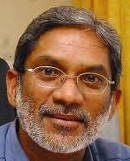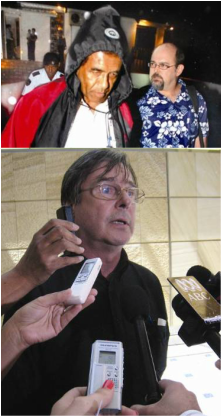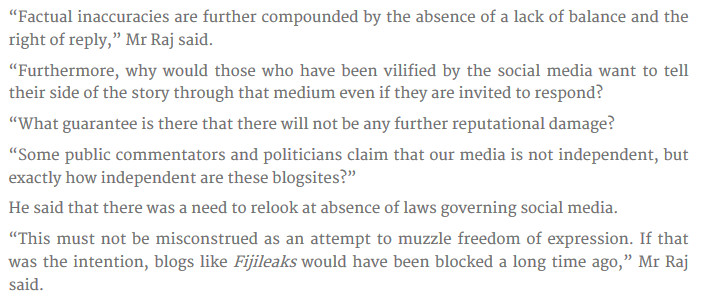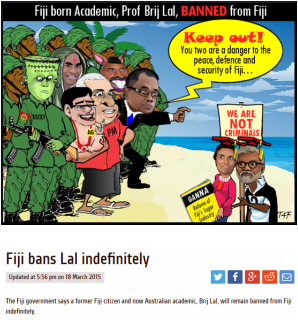Fijileaks to Readers: We will respond soon to MIDA HOUND DOG who expects Fijileaks to become another pro-regime rag sheet:
"I walked away from ANU for all sorts of reasons: personal...Also, the intellectual trajectory of my work has shifted dramatically. I don't think that my then supervisor Prof. Brij Lal was best suited and theoretically trained to supervise. Incidentally, ANU is very anti theory and I was trained in the US by Gayatri Spivak the leading philosopher in Marxism, deconstruction and post-colonialism. I think Brij's work is mired in romanticism.' Ashwin Raj, 27 March 2014, responding to comments from Fijileaks readers who wanted to know why he did not complete his PhD at Australian National University; Fijileaks gave him the right of reply before approving any of the comments. He cheerfully responded, saying Brij Lal was the 'wrong academic supervisor for his thesis" |
John Samy to Bainimarama: The Letter outlining contentious issues!
"In regard to the current Minister for Finance (Mahendra Chaudhry) following the disclosures about his private financial arrangements. Subsequent to this, you indicated that you asked the Minister concerned to refrain from making any public statements on issues not directly related to his portfolio. Your directive has clearly been disregarded. Recently, the fact that the Minister spoke on Peoples Charter and referendum, etc while visiting India has not helped. It gave further fodder to the ethno-nationalists in Fiji who are vigorously opposed to the Peoples Charter." John Samy |

I feel compelled to write to you, to inform you that in view of a number of recent developments, I feel greatly compromised in continuing to serve as Head of TASS. Several key, senior members of my TASS team feel likewise.
Please recall our discussions of March, 2007 when I first met you. Among the range of issues that we had then discussed, including in the meeting that you had kindly arranged for me with the Military Council, please recall that I had raised the issue of leadership. In particular, I had put to you, and also the Military Council, what legacy you all wished to leave behind you as leaders: is it one of a repressive regime that trampled upon the basic human rights of the people or is it to regain and redeem the image and reputation of both the RFMF and also Fiji. We had discussed the great importance of all this in order for Fiji to regain its rightful place, in and to re-integrate into, the international family of nations.
From those discussions in March 07, and since then, as I have got to know you more personally, I have been convinced about your personal motivations, ie that you truly and sincerely seek to rebuild Fiji towards the soundly governed and prospering democracy that it should always have been. I also had believed that the Interim Government, under your leadership, was completely committed to those same objectives and have expected it to demonstrate this, consistently, through its actions. Now, in the light of a number of recent experiences, it has become extremely difficult for me to remain so convinced of the Interim Government’s intentions, particularly in regard to the way forward.
As you know, on the Peoples Charter, despite the enormous pressures, the distractions and the efforts to derail it, we have been making good progress. This is because in both NCBBF and TASS, we have people who are highly dedicated, hardworking and patriotic. Moreover, the ordinary people of Fiji look up to the Peoples Charter with hope, at a time when hopelessness, deprivation and hardship is on the rise.
The mainstream media has sided with those who remain steadfast in their opposition to you and the Interim Government. They have been vigorous in their efforts to discredit NCBBF and to derail the Peoples Charter process. As nasty as the vilification of much of the media and the more disgruntled leaders of Fiji’s society has been, it has not dissuaded us in any way from our conviction to move ahead with the crucial work on the Peoples Charter. Nothing about the pressures and the opposition that we have faced, including the vilifications that I have personally endured, have in any way influenced what I now say to you in this letter.
In Fiji today, the opponents of progress in this society are those who fear the loss of power, privilege and opportunities for corruption. It is apparent that they would stop at nothing to undermine the Interim Government and the work on the People’s Charter. It is sad that they seem better organized and more effective than the government. Moreover, the Interim Government does not help its own cause when it acts in ways that tantamount to shooting its own feet.
The vision of a better Fiji through the Peoples Charter is, among other things, about good political governance, ie adhering to the highest standards of accountability, transparency and the rule of law. However, when it comes to promoting good governance we are very much dependent on the Interim Government to lead by example, to demonstrate consistently, through its actions, that change is not only intended through the Peoples Charter at a later date, but that it is being made now. Unfortunately, the Interim Government has tended to fail on this vital test. Some IG decisions do not appear to be or have not been in accord with basic principles of good governance. Coordination within the IG is weak and often leaves the government under-prepared. Too much of the way the Government goes about its work shows little anticipation of the possible opposition or consequences that lie ahead. There is little sense of building coalitions for support or of networking in any effective way. Despite the many good actions that the Government tries to take, it seems unable to communicate effectively about its intentions. The overall public relations track record of the IG is dismal.
What has been of real and growing concern, in recent months, is that some of the more high profile activities of the Interim Government have been conducted in such a recklessly indifferent way as to undermine effective governance. These have seriously impacted on our work on the Peoples Charter, constraining our ability to make a credible case to the people of Fiji as to the urgent need to instill good governance across all institutions in Fiji, public and private.
There have been a number of incidents which have enabled the Interim Government’s many detractors to portray it as the very antithesis of good governance. I would like to recall a few, as examples.
Please recall my submissions to you in regard to the current Minister for Finance (Mahendra Chaudhry) following the disclosures about his private financial arrangements. Subsequent to this, you indicated that you asked the Minister concerned to refrain from making any public statements on issues not directly related to his portfolio. Your directive has clearly been disregarded. Recently, the fact that the Minister spoke on Peoples Charter and referendum, etc while visiting India has not helped. It gave further fodder to the ethno-nationalists in Fiji who are vigorously opposed to the Peoples Charter.
A further example is the decisions taken by the Interim Government in regard to the Great Council of Chiefs. The case for change, as I know through you, are well based but this could have been handled in ways that were more inclusive and consultative.
 Hannah (top) and Hunter (below)
Hannah (top) and Hunter (below) The decision late last week to deport Mr. Evan Hannah, again supposedly on “national security” grounds, has brought to a head my concerns about what is the real attitude of the Interim Government to good governance. There appear to be very few people in Fiji who see this as other than a vindictive act aimed at muzzling the media. To follow that up by the government making a statement to the public a day later, and that too on World Media Freedom Day, that it promotes a free media and free speech was both puzzling and did not help enhance the credibility of the Interim Government. In addition, and probably even more seriously, Mr Hannah’s deportation now appears to have also called into question the attitude of the Interim Government to the rule of law and to the legal courts of Fiji.
In summary, the perception of the Interim Government that is emerging is that it is not caring, that it is high-handed and reckless, and that it is unable to get things ( that matter ) done. The Fiji Civil Service of which you are the head, is currently neither “civil” nor is it service –oriented, especially as it is evident that a large part of the Public Service is not aligned to the goals and direction of the Interim Government. In fact there is reason to believe that it is working against the interests of the IG. In addition, the use of strong arm tactics, such as in the deportations of Hunter and Hannah, has profoundly negative consequences and raise fears that the Military may be seeking to entrench itself in the political governance of Fiji.
Moreover, such actions appear to be being taken in total disregard to their many obvious consequences and without consideration of whether there were other, better options. For example, if the motivation behind the recent deportations is to convince the media to behave more responsibly, then I am afraid that precisely the opposite would in fact be achieved. It has also undercut the ability of the NCBBF to respond to one of its terms of reference, by coming up with acceptable ways to improve the working relationship between the media and the government in the interests of promoting good governance
The Hannah deportation incidence has dramatically sabotaged the environment that we are working on. It now can be expected to have a whole range of consequences, such as an even more rabid opposition to the People’s Charter; the probable refusal of political parties to engage in the forum on electoral reform; an inability to progress the much-needed efforts on political dialogue; and a likely failure to find ways that enable international development partners to engage with Fiji in the foreseeable future. This is regrettable as on all of these fronts, I believe the NCBBF was making good progress.
These opportunities have probably now been seriously impaired if not lost. Unless the Interim Government is able to quickly access new sources of political advice that convincingly help it to practice good governance, while steering a more measured and sure footed course towards an election, the prospects for the NCBBF’s work on the Peoples Charter being successfully brought to a conclusion are now extremely bleak.
It is for these reasons, with the bulk of my concerns being on issues of principle related to good governance, that I have felt I should communicate in this candid way to you. I suggest that we meet to discuss all this, and in particular, where do you wish to go from here and on whether there remains a role for me and my senior colleagues in TASS, in going forward.
Yours sincerely
John Samy
4 May 2008








